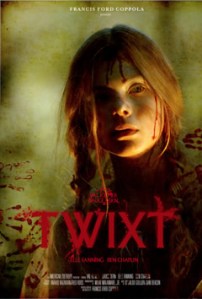By Tim Lucia
 At this years Cannes Film Festival, films were by released by two of the only ‘true’ auteurs still working, Terrence Malick and Lars von Trier. The Tree of Life and Melancholia were their films, respectively; with Malick’s winning the Palme d’or. Nicolas Winding Refn, whose previous films Bronson and Valhalla Rising followed the auteur theory, released Drive, a modern crime drama with Ryan Gosling. This is Refn’s first English language film, and also his first in which he does not have a writing credit. Critically acclaimed, Refn — like many others — has used his film as a jumping-off point to break into more mainstream cinema. His upcoming projects include another thriller and a remake of Logan’s Run, with Gosling attached to star in both.
At this years Cannes Film Festival, films were by released by two of the only ‘true’ auteurs still working, Terrence Malick and Lars von Trier. The Tree of Life and Melancholia were their films, respectively; with Malick’s winning the Palme d’or. Nicolas Winding Refn, whose previous films Bronson and Valhalla Rising followed the auteur theory, released Drive, a modern crime drama with Ryan Gosling. This is Refn’s first English language film, and also his first in which he does not have a writing credit. Critically acclaimed, Refn — like many others — has used his film as a jumping-off point to break into more mainstream cinema. His upcoming projects include another thriller and a remake of Logan’s Run, with Gosling attached to star in both.
Malick has another film in the works, an untitled project starring Ben Affleck and Rachel McAdams, with a tagline of “a powerful and moving love story”. Malick has remained an auteur his entire career. The Thin Red Line is his only film based on previous material, but it’s still an auteur film. Malick interpreted it his own way — the way Stanley Kubrick did with 2001, A Clockwork Orange, Barry Lyndon, and The Shining. The Tree of Life pushed the boundaries of filmmaking in a way that conventional audiences are not used to. Extremely loose story structure and beautiful cinematography dominate Malick’s film, which brought to mind Koyaanisqatsi and Baraka more so than any of Malick’s previous films. 
Lars von Trier is an auteur whose films can be very painful to watch. However, he is absolutely brilliant as a filmmaker and he refuses to cave in and do what others want him to do. He continues to push the envelope, despite how depressed and/or sickened his audience may be after viewing one of his films. David Lynch is another true auteur, though he has not made a feature since 2006’s Inland Empire, which was almost a sequel to his more successful Mulholland Drive. Lynch has always had a distinct style and cult following, and he can truly be considered as the author of all his films.
David Gordon Green is a director whose first film, George Washington, is an auteur film. Similar to Malick’s earlier films, Green tells a beautiful, moving, and unconventional story through the lens of his camera. Green followed that film with three very good, understated dramas: All the Real Girls, Undertow, and Snow Angels, before getting into comedy with Pineapple Express, Eastbound and Down, and Your Highness. Like Refn, he used auteurism as a launching pad to further his career down the road.
 Francis Ford Coppola has recently returned to being an auteur, independently financing his last three features: Youth Without Youth, Tetro, and the upcoming Twixt (promoted at this year’s Comic-Con). His old rival, Martin Scorsese — who was once an auteur — has the family adventure Hugo coming out this Christmas. Paul Thomas Anderson (probably my favorite of the younger generation of directors) could arguably be considered an auteur. His upcoming film The Master stars Philip Seymour Hoffman as the leader of a faith-based organization in the ’50s. It seems like it could be similar to Anderson’s last film There Will Be Blood, which was possibly his most auteur-like. Boogie Nights is great film, and could be considered an auteur effort, but there is much homage to Scorsese. It would be nice to see more established directors taking chances and pushing the envelope to get different kinds of stories and films on the screen. Maybe said directors would have their names elevated in the discussions of the all-time greats by doing so.
Francis Ford Coppola has recently returned to being an auteur, independently financing his last three features: Youth Without Youth, Tetro, and the upcoming Twixt (promoted at this year’s Comic-Con). His old rival, Martin Scorsese — who was once an auteur — has the family adventure Hugo coming out this Christmas. Paul Thomas Anderson (probably my favorite of the younger generation of directors) could arguably be considered an auteur. His upcoming film The Master stars Philip Seymour Hoffman as the leader of a faith-based organization in the ’50s. It seems like it could be similar to Anderson’s last film There Will Be Blood, which was possibly his most auteur-like. Boogie Nights is great film, and could be considered an auteur effort, but there is much homage to Scorsese. It would be nice to see more established directors taking chances and pushing the envelope to get different kinds of stories and films on the screen. Maybe said directors would have their names elevated in the discussions of the all-time greats by doing so.